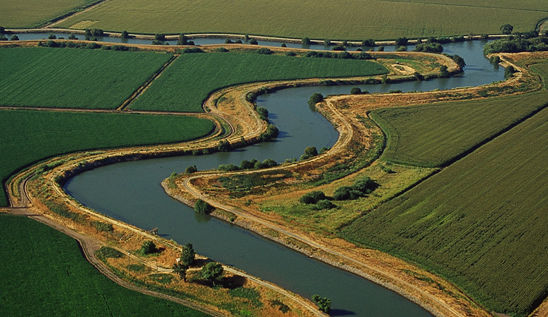
The long-simmering struggle over how California’s water resources are allocated took center stage again this week as Governor Jerry Brown and U.S. Interior Secretary Ken Salazar unveiled the latest plan to shift more water from the northern part of the state to the more arid south.
The controversial plan, announced at a July 25 press conference in Sacramento, calls for two parallel 37-mile underground tunnels, each 33 feet in diameter, to carry water from the Sacramento River – the state’s largest – to pumping facilities in central California. Water would then flow through canals to areas stretching from the San Francisco Bay Area south all the way to San Diego, bringing more water to southern California cities and irrigating millions of acres of agribusiness farmland in the Central Valley.
The project is slated to start in 2017 and be completed by 2026.
The plan also includes restoration of the Sacramento-San Joaquin River Delta, the state’s greatest wetland, which has deteriorated in recent decades under pressure from increasing water needs.
While water users would pay the $14 billion tab for the tunnels, taxpayers would pay for restoration of the Delta, through funds from the federal government and part of an $11 billion water bond slated for the 2014 ballot.
The new project is similar to a “peripheral canal” Brown proposed in 1982, during an earlier term as governor, which was rejected by voters. In 2009 the state legislature passed Republican Gov. Arnold Schwarzenegger’s Comprehensive Water Package, which observers say lays the basis for a massive water diversion project that doesn’t require voters’ approval.
Residents of the Delta, area Native American tribes, environmentalists, family farmers, fishers, and a number of elected officials strongly oppose its construction.
Earlier this month, 11 northern California members of Congress – all Democrats – wrote to Salazar, raising significant questions about costs and environmental issues, and urging that announcement of the project be delayed for further analysis.
On the other hand, the state’s two senators – both Democrats – have written in support of the project.
In a July 25 statement, Kate Poole, senior attorney with the Natural Resources Defense Council, said the Delta and people and wildlife depending on it “should not be held hostage by outdated ‘tunnel vision.'” She called for use of “21st century technology” including recycling, conservation and more efficient water usage.
Poole said “no credible science” backs diverting more water from the Delta “without continuing to sacrifice an ecosystem in peril.”
Last month the California Water Impact Network of 30 environmental, Native American and fishers’ organizations, called the proposed tunnels “a huge mistake,” “poorly conceived” and “destructive.” They cited environmental concerns and foresaw potential costs well beyond those projected by Brown and Salazar.
“Please do not put the interests of South-of-Delta water contractors before the public and San Francisco Bay-Delta dependent farmers, fishermen and local communities,” their letter said. Among signers were leaders of the Sierra Club, Environmental Water Caucus, Winemem Wintu Tribe and Friends of the Earth.
Writing last month in the San Francisco Chronicle, Bill Jennings of Restore the Delta pointed out that two-thirds of delta water exports now serve corporate agriculture and only a third goes to urban areas inhabited by half the state’s population.
“There is water for both people and fish if it is efficiently and equitably used,” Jennings said. “But the estuary cannot survive the waste of subsidized water to grow subsidized crops in the desert.”
Photo: Sacramento-San Joaquin River Delta. ucsd.edu.












Comments